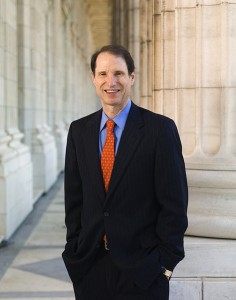If you have nothing to hide, what’s with the pants?
 Oregon’s senior senator Ron Wyden has spent years trying to make Americans aware of the secret surveillance law being written by a secret court made up of judges all appointed by one man — Chief Justice John Roberts.
Oregon’s senior senator Ron Wyden has spent years trying to make Americans aware of the secret surveillance law being written by a secret court made up of judges all appointed by one man — Chief Justice John Roberts.
Wyden along his colleague Mark Udall attempted to get Congress to make that court’s decisions public. Congress refused to do so. Wyden tried to get the director of National Intelligence James Clapper to admit the scope of National Security Agency surveillance. He refused to do so.
And most Americans remained ignorant of how we may be spying on ourselves and the rest of the world — until Edward Snowden leaked what he’d taken during his time working as a contractor for the NSA.
”If we do not seize this unique moment in our constitutional history to reform our surveillance laws and practices,” Wyden told the Center for American Progress Action Fund in July, “we are all going to live to regret it.”
The moment for reform could easily slip away with just one hint of the attacks that terrified us into foolishness after 9/11.
President Obama, as much as he could, seized on the moments of reform when it came to the Stimulus, which is transformed the energy sector and stopped the layoff crisis, and health care. Some would argue that he did the same when it came to big banks.
But those reforms missed out on doing the one thing that mattered most: making banking boring.
The easiest way to do this would to have broken up the big banks. That wouldn’t have prevented the financial crisis but it would have limited the scope of that or any future crisis. But even at their weakest point, the banks still owned the Senate and the key vote for reform — Senator Scott Brown.
President Barack Obama gave an urgent behind-the-scenes warning to his economic team about the need to take action to avoid another economic meltdown.Another Lehman Brothers-style blow up is probably not on the horizon, said Rana Foroohar, editor with Time magazine.
“However there is arguably a bigger problem, which is sort of this slow burn – that banks are making record profits, they’re back on top, but lending still isn’t where it should be,” said Foroohar.
Banks are recording top profits, said Foroohar, “but it’s from trading, it’s from the risky maneuvers that we saw pre-2008, not from lending to real businesses.”
“I think the president is really concerned about is an asset bubble,” said Jim Tankersley, economic correspondent with The Washington Post.
The regulations for reforms that did pass are only 1/3 written thanks to the millions the financial sector spends to lobby regulators and Washington D.C.. And five years after the crisis, the banks are bigger than ever and so is the risk to our financial system.
America’s financial industries and the national security state are almost impermeable to dissent — except at key moments when Americans recognize that the stability both promise may be at the expense of our freedoms, both economic and political, and decency.
I don’t have to imagine a Republican president back regulating Wall Street and running military-intelligence complex to fear that we will live regret missing these moments. But when I do, the thoughts are chilling.
None of this is easy to do. None of these concerns are settled legally or ethically.
The questions aroused by Snowden’s disclosures are as prickly and complex as the characters behind the effort to release the information. Is metadata different that information on the outside of a letter? Can surveillance of this scope ever be put under proper oversight? Does our unchecked willingness to watch foreigners hurt us competitively? Does just the specter of this kind of surveillance make freedom of expression an illusion?
These are questions no one considers when security is at stake. But we have a moment now.
Seize it now or regret it forever.



